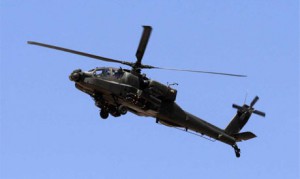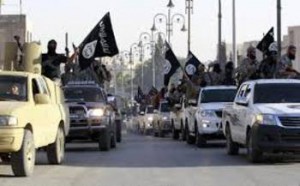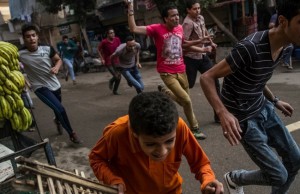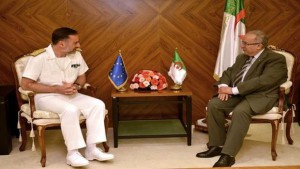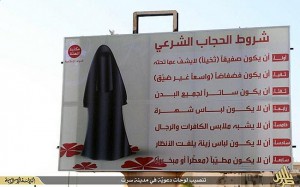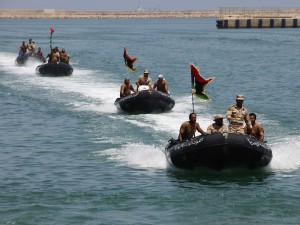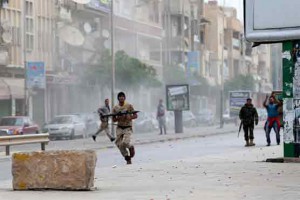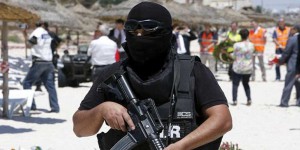Egyptian security sources said Saturday that 23 militants had been killed in three air strikes in the northern Sinai Peninsula, according to a report by Sky News in Arabic.
ISIS vows to storm Algeria
ISIS vowed in a video message to expand its activities in Algeria.
ISIS militants released a statement from the group’s media office in Syria’s Raqqa, saying the war will expand in Algeria, accusing Algerians of apostasy.
The terrorist group called on its militants and supporters in Algeria to fight apostasy.
In the video message, ISIS militants Abu Bara al-Jazaeri and Abu Hafs al-Jazaeri demanded Algerian people to announce allegiance to the ISIS , vowing opponents of a massive war.
The ISIS extremists said that a group of people in Skikda state and the desert of Algeria pledged allegiance to the alleged caliph Abu Bakr al-Baghdadi.
“We are glad that our brothers in Skikda and Algerian desert swore allegiance to the ISIS and its caliph. All groups in this country should join our ranks,” an ISIS member said in the video.
“If the war spread in the land of Algeria, we (IS) will definitely head to Andalusia.”
Six Muslim Brotherhood supporters killed in clashes in Cairo
Six supporters of Egypt’s outlawed Muslim Brotherhood were killed in clashes with Cairo residents Friday, the state news agency MENA reported.
MENA quoted an Interior Ministry source as saying security forces intervened and arrested 15 armed Brotherhood members. Brotherhood protests had largely faded under a tough security crackdown.
A Health ministry official told Reuters that six people died in clashes between Brotherhood supporters and police.
Algeria receives Commander of EUNAVFOR Med, Rear Admiral Enrico Credendino
Minister of Foreign Affairs and International Cooperation Ramtane Lamamra received Thursday, in Algiers, Rear Admiral Enrico Credendino, Commander of the European Union (EU) Naval Force in the Mediterranean, called EUNAVFOR Med.
“EU has established an agenda on the migration in ten points. We are working in a comprehensive approach to face the issues of migration. I am here to explain my mission and listen to the Algerian concerns and proposals about this issue,” said Rear Admiral Enrico Credendino, in a brief statement to the press at the end of the audience granted to him by Lamamra.
This visit “is part of a tour which aims at informing the countries of the nature on the nature of the missions assigned to this operation launched in June 2015 to fight against migrant trafficking networks in the Mediterranean Sea,” said Foreign Affairs Ministry in a communiqué.
The visit shows “the importance given by the European partner to the position and role of Algeria in the region and also the commitment of our country to the virtues of dialogue and consultation to take up the common challenges,” according to the source.
Daesh puts up a billboard on women’s dress code in Libya
Several reports have come out about Daesh (ISIS) imposing restrictions on women since it took over parts of Syria and Iraq. Billboards, however, are a first.
Al-Wasat reported on Monday the militants put up a billboard in Sirte, Libya, outlining the dress code for women and including an illustration in case you had forgotten that you’re not supposed to resemble a human at all.
Here’s the spotted billboard.
Translation, provided by al-Wasat:
1. No see-through clothes
2. Only wear loose-fitting clothes
3. Must cover all body parts
4. No name brands
5. Do not wear masculine items or items worn by faithless women
6. No clothes with designs that will attract attention
7. No perfumed clothes
Women in previous reports on Syria and Iraq have complained about not being able to breathe under the Daesh-imposed burka, through which they’re not allowed to expose eyes or mouths.
But even with the dress code in place that essentially turns women into bulky, moving black sheets, ladies aren’t allowed in public during Ramadan during the day. After Iftar they may be accompanied by a male family member outside, though that’s also discouraged.
Our guess is the extremists haven’t had very many interactions with women. Otherwise they’d know the skin on their wrists won’t blind them and, in fact, doesn’t look much different from a man’s wrist. Should someone tell them women aren’t vampires, and that their skin doesn’t sparkle in the daylight?
Islamedianalysis will return online Thursday, July 16. Stay tuned!
Libya’s recognized government warns tankers away from Ras Lanuf port
Libya’s recognized government warned its security forces would seize any tankers approaching the Ras Lanuf terminal without permission, saying any attempt to make oil deals with the rival government in Tripoli would be “piracy”.
The warning over Ras Lanuf illustrates how the OPEC country’s oil industry is caught up in a power struggle between the two rival governments.
Morocco arrests 8 from ‘Islamic State recruitment cell’
Morocco had arrested eight people suspected of operating a recruitment cell for the Islamic State group in the North African kingdom.
Cell members “secured the transfer of dozens of fighters… in coordination with elements operating on the border between Turkey and Syria,” said an interior ministry statement carried by the official MAP news agency.
The recruits were charged with “carrying out suicide car bomb operations in Iraq and Syria” for the extremist group, the statement added.
The arrests were made by the Central Bureau of Judicial Investigations, a unit formed in March as part of the kingdom’s counterterrorism push.
Morocco has frequently announced the arrest of “terrorist cells” and reported seizing weapons from groups authorities say have pledged allegiance to IS.
According to the British-based International Centre for the Study of Radicalisation, about 2,000 Moroccans are estimated to be fighting with IS in Iraq and Syria.
14 killed in clashes in Libya’s Benghazi
At least 14 people were killed in battles in Libya’s second city Benghazi between militiamen and forces loyal to the internationally recognized government, hospital officials said Thursday.
The fighting erupted Wednesday morning in the center of the city, cradle of the 2011 NATO-backed uprising that toppled and killed veteran president Moammar Gadhafi, the officials said.
The Benghazi Medical Centre said on its Facebook page that it had received the bodies of 13 people as well as 50 wounded.
Al-Jalaa hospital said it was hit by a rocket that killed one person and wounded three.
It was not immediately clear if those killed and wounded in the clashes – which subsided late Wednesday – were civilians or fighters.
Benghazi has been reeling from more than a year of near-daily clashes between pro-government forces and armed groups, including Islamists, battling for control of the eastern city.
At least 1,700 people have been killed in the violence since early 2014, according to the Libya Body Count watchdog.
Elsewhere in Libya, a senior military intelligence officer was killed in third city Misrata Wednesday when a bomb concealed in his car exploded, a security official said.
The officer, Taher Allush, was close to Fajr Libya, a militia alliance which seized Tripoli in August last year and set up a rival government and parliament.
Libya was plunged into chaos after the overthrow of Moammar Gadhafi’s regime in 2011, with rival militias fighting for their own territorial and financial interests in the oil-rich country.
Tunisia fears more potentially destabilising ‘terrorist attacks’
Tunisia fears more potentially destabilising “terrorist attacks,” like the one that killed 38 foreign tourists last month, which is why it has imposed a state of emergency, the premier said Wednesday.
Eight days after the June 26 shootings at the Mediterranean resort of Port El Kantaoui, President Beji Caid Essebsi decreed on Saturday a state of emergency for 30 days.
The rampage by a Tunisian student killed 30 Britons, three Irish nationals, two Germans, one Belgian, one Portuguese and a Russian, and was claimed by the Islamic State group.
“We are engaged in a ferocious war against terrorism to protect lives and property, defend the republican regime… the civil state and its institutions,” Prime Minister Habib Essid told parliament.
“We would not have felt obliged to decree the state of emergency if we were not convinced that our country was facing numerous terrorist plans to destabilise the country,” he said.
He spoke of “the gangs of terrorism, murder and crime preparing other operations… aimed at killing the maximum number of people, undermining morale and grinding the national economy to a halt.”
Essebsi spoke as rights groups warned the state of emergency should not suppress freedoms gained since the 2011 revolution that overthrew longtime dictator Zine El Abidine Ben Ali.
But while saying “whatever it takes, we will prevail over terrorism,” this would not come at the expense of human rights.
These will “not be touched,” he said.
Meanwhile, Tunisia will complete construction of a barrier along the Libyan border, from Ras Jedir on the Mediterranean coast to Dhiba, 186 kilometres (115 miles) to the southwest, a defence ministry official said.
The barrier, which will include berms and trenches, was announced after a terrorist attack on the national museum in Tunis in March killed 22 people, mostly tourists.
Work began on the barrier in April and will be completed by year-end, Belhassan Oueslati said.
The interior ministry said Wednesday that 33 young Tunisians, mostly Muslim fundamentalists, have gone missing, with media saying that their families fear they have joined extremist groups in Libya.
Members of the group, which includes one woman, are aged between 16 and 35, it said, adding that their families reported them missing from the southern province of Tataouine.
The perpetrators of both the beach and museum attacks were said to have been trained in Libya.
The state of emergency grants the security forces exceptional powers. Among them, it allows the authorities to bar strike action and public meetings deemed dangerous to public order and to increase controls on the media.
The current state of emergency is not the first to be imposed in Tunisia since the revolution that sparked the Arab Spring.
There was also one in force from January 14, 2011 — hours after the flight of dictator Ben Ali — until March last year.
- « Previous Page
- 1
- …
- 208
- 209
- 210
- 211
- 212
- …
- 248
- Next Page »
